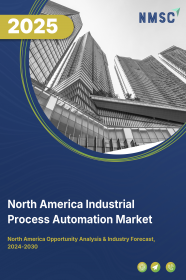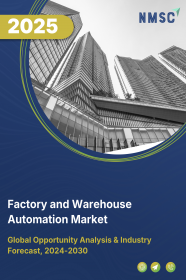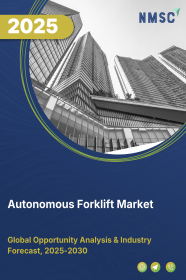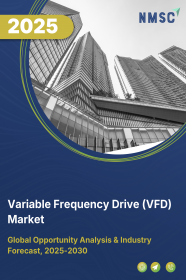
North America Industrial Process Automation Market by Component {MES (Hardware, Software, Services); DCS (Hardware, Software, Services); PLC (Hardware, Software, Services); SCADA (Hardware, Software, Services); Field Instruments; Industrial Robots; Human Machine Interface; Industrial PCs; Process Analyzers & Drives} and by End User (Oil & Gas, Chemicals & Refining, Energy & Power, Pulp & Paper, Metals & Mining, Pharma, & Others) – Global Opportunity Analysis and Industry Forecast, 2025–2030
Industry: Semiconductor & Electronics | Publish Date: 31-Oct-2025 | No of Pages: 173 | No. of Tables: 128 | No. of Figures: 73 | Format: PDF | Report Code : SE976
Industry Outlook
The North America Industrial Process Automation Market was valued at USD 20.34 billion in 2024 and is projected to grow to USD 21.86 billion by 2025. Additionally, the industry is expected to continue its growth trajectory, reaching USD 27.88 billion by 2030, at a CAGR of 5.39% from 2025 to 2030.
The adoption of smart manufacturing technologies, rising labor costs, and workforce shortages are driving the North America industrial process automation market growth. Smart manufacturing, integrating IIoT, cloud computing, big data analytics, and AI, enables real-time monitoring, predictive maintenance, and data-driven decision-making, enhancing efficiency, reducing downtime, and improving operational flexibility.
Labor pressures and skill gaps further encourage industries to automate repetitive and labor-intensive tasks, boosting productivity and competitiveness. However, high implementation costs, including investments in robotics, advanced sensors, AI platforms, and system integration, restrain the industrial process automation market expansion, particularly for small and medium-sized enterprises.
Looking ahead, the integration of AI and machine learning presents significant growth opportunities, enabling predictive maintenance, workflow optimization, and real-time decision-making, ultimately enhancing efficiency, reducing downtime, and strengthening the region’s position in a digitally transforming industrial landscape.
Adoption of Smart Manufacturing Technologies Fuels Market Growth
The rising adoption of smart manufacturing technologies accelerates the North America industrial process automation market demand. Smart manufacturing integrates IIoT, cloud computing, big data analytics, and artificial intelligence to optimize industrial processes. These technologies support real-time monitoring, predictive maintenance, and data-driven decision-making, thereby enhancing operational efficiency and reducing downtime.
According to IoT Analytics GmbH, North America accounted for 36% of global Industry 4.0 adoption, positioning itself as a leader. The region also benefits from the presence of leading technology providers such as Microsoft, IBM, and Amazon, which play a pivotal role in driving advancements. As a result, smart manufacturing adoption strengthens productivity, operational flexibility, and long-term competitiveness.
Rising Labor Costs and Workforce Shortages Drive Automation
Workforce shortages and escalating labor costs further drive the North America industrial process automation market trends. Industries face challenges in recruiting skilled workers due to an aging workforce and declining interest in industrial jobs.
According to the International Labour Organization (ILO) in 2025, labor costs in North America averaged USD 80.3 per hour. These pressures push companies to adopt automation technologies to close skill gaps, boost productivity, and lower operational expenses. By automating repetitive and labor-intensive tasks, industries mitigate workforce challenges while enhancing efficiency and competitiveness.
High Implementation Costs Restrain Market Expansion
Despite strong growth drivers, the high initial cost of implementing smart manufacturing solutions restrains the North America industrial process automation market expansion. Capital-intensive investments in robotics, advanced sensors, AI-enabled platforms, and system integration deter small and medium-sized businesses.
The uncertainty of return on investment and the financial burden of maintenance and training add to adoption challenges. This limits widespread deployment, particularly among cost-sensitive enterprises.
Integration of AI and Machine Learning in Industrial Process Automation Creates Growth Opportunities
The integration of artificial intelligence and machine learning into industrial robotics, presents a major opportunity for market growth in North America. These technologies enhance predictive maintenance, improve production accuracy, and enable real-time decision-making.
By embedding AI-driven insights into automation systems, industries achieve higher efficiency, reduce downtime, and optimize resource allocation. This shift not only strengthens operational agility but also positions businesses to remain competitive in a digitally transforming industrial landscape.
The U.S. Holds the Dominant Market Share in the North American Region
The U.S. dominates the North America industrial process automation market share and is strongly driven by labor shortages and increasing labor costs. Companies face difficulties in attracting skilled workers due to an aging population and declining interest in industrial jobs.
According to the International Labour Organization (ILO) 2025, labor costs in the U.S. averaged USD 81.8 per hour. Automation technologies help bridge these workforce gaps, enhance productivity, and reduce operational expenses, thereby stimulating market expansion.
Additionally, the growing consolidation of mining operations supports productivity gains and process optimization, further driving demand for automation solutions. The penetration of Industry 4.0 technologies, including smart factories and networked systems, provides a significant impetus to the market.
Advanced networking solutions such as 5G enable real-time data transfer, machine-to-machine communication, optimized manufacturing efficiency, and reduced downtime. For example, in September 2024, Ericsson announced enterprise-led adoption of private 5G networks, showcasing solutions that support efficient automation deployment. Such investments accelerate the adoption of automation technologies to maximize operational efficiency across industries in the U.S.
Mexico to Witness Substantial Growth in the North America Industrial Process Automation Market
Government initiatives and industry adoption of advanced technologies are significantly fueling the growth of the industrial process automation sector in Mexico. The increasing deployment of robotics, artificial intelligence (AI), and the Internet of Things (IoT) is enhancing operational efficiency and product quality across key sectors, particularly manufacturing.
According to the World Robotics Report 2024, Mexico ranked ninth among 15 major markets in 2023, with approximately 6,000 industrial robots installed annually. These investments reflect Mexico’s strategic focus on adopting sophisticated technologies, strengthening its industrial base, and positioning the country for future economic growth and competitiveness.
Additionally, rising labor costs are a major driver for industrial process automation in Mexico. Rising expenses related to hiring and retaining skilled workers are compelling organizations to implement automated solutions to enhance productivity, reduce operational costs, and maintain efficiency.
OECD data indicate that Mexico’s nominal minimum wage increased by 142% in May 2024, reflecting a growing need for businesses to adopt automation technologies as a strategic response to labor cost pressures. This trend underscores the industry’s potential for continued adoption of automation solutions as companies seek sustainable ways to maintain competitiveness in a changing economic environment.
Competitive Landscape
The promising players operating in the North America industrial process automation industry include Siemens AG, Mitsubishi Electric Corporation, Schneider Electric SE, Honeywell International Inc., ABB Ltd., Toshiba Corporation, Emerson Electric Co., Rockwell Automation Inc., Omron Corporation, Valmet Oyj, Yokogawa Electric Corporation, Endress+Hauser, Dwyer Instruments Inc., Fuji Electric Co., Ltd., and Festo, and others.
North America Industrial Process Automation Market Key Segments
By Component
-
Manufacturing Execution Systems (MES)
-
Hardware
-
Software
-
Services
-
-
Distributed Control Systems (DCS)
-
Hardware
-
Software
-
Services
-
-
Programmable Logic Control (PLC)
-
Hardware
-
Software
-
Services
-
-
Supervisory Control and Data Acquisition (SCADA)
-
Hardware
-
Software
-
Services
-
-
Field Instruments
-
Industrial Robots
-
Human Machine Interface (HMI)
-
Industrial PCs
-
Process Analyzers and Drives
By End User
-
Oil and Gas
-
Chemicals and Refining
-
Energy and Power
-
Pulp and Paper
-
Metals and Mining
-
Pharma
-
Cement & Glass
-
Others
By Country
-
U.S.
-
Canada
-
Mexico
Key Players
-
Siemens AG
-
Mitsubishi Electric Corporation
-
Schneider Electric SE
-
Honeywell International Inc.
-
ABB Ltd.
-
Toshiba Corporation
-
Omron Corporation
-
Valmet Oyj
-
Yokogawa Electric Corporation
-
Endress+Hauser AG
-
Dwyer Instruments Inc.
-
Fuji Electric Co., Ltd.
-
Festo
Report Scope and Segmentation:
|
Parameters |
Details |
|
Market Size Value in 2025 |
USD 21.86 billion |
|
Revenue Forecast in 2030 |
USD 27.88 billion |
|
Value Growth Rate |
CAGR of 5.39%from 2024 to 2030 |
|
Analysis Period |
2024–2030 |
|
Base Year Considered |
2024 |
|
Forecast Period |
2025–2030 |
|
Market Size Estimation |
Billion (USD) |
|
Growth Factors |
|
|
Companies Profiled |
15 |
|
Countries Covered |
10 |
|
Customization Scope |
Free customization (equivalent to up to 80 working hours of analysts) after purchase. Addition or alteration to country, regional, and segment scope. |
|
Pricing and Purchase Options |
Avail customized purchase options to meet your exact research needs. |

















 Speak to Our Analyst
Speak to Our Analyst
























